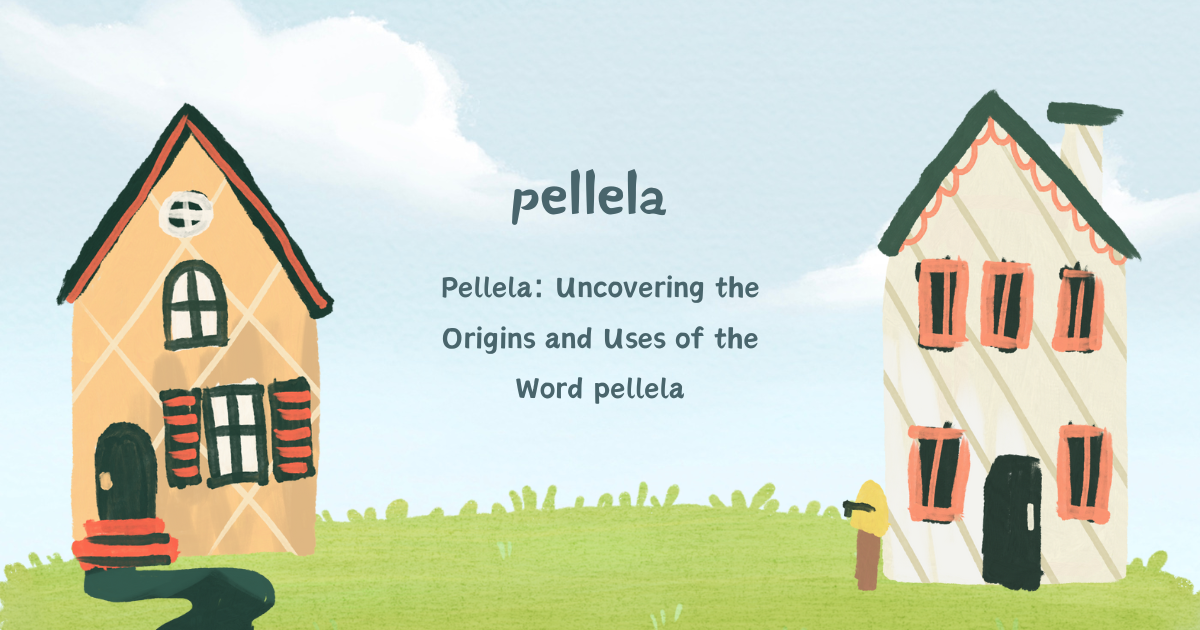Introduction to pellela
The word pellela carries a unique intrigue due to its rare usage and uncertain meaning. It’s not widely recognized in mainstream dictionaries or global languages, which opens up a realm of possibilities for its interpretation. This ambiguity makes it both fascinating and mysterious, often leading people to wonder about its background and potential applications in language, culture, or even branding.
In many cases, when a term is this obscure, it may exist in smaller regional dialects or have evolved from older, forgotten words. The spelling of pellela suggests a phonetic structure that could come from Romance or African linguistic roots. Despite its elusive presence, the word continues to appear in various online and informal contexts, prompting curiosity and deeper investigation.
Pellela in Spoken Language
In spoken language, particularly in areas where dialects shift frequently, pellela could easily be a regional variation of a more common term. It might represent a child’s word, a colloquialism, or maybe a localized slang expression. These kinds of words are often passed down verbally and rarely appear in formal texts, making them hard to document yet rich with meaning.
Language often adopts such terms through oral tradition, where pronunciation evolves depending on location, accent, and context. In this way, pellela might be rooted in the everyday speech of a small community, later emerging in writing through phonetic spelling. This oral-to-written transition creates a space for multiple interpretations, each with cultural significance.
Pellela as a Surname
There are rare instances where pellela appears to function as a surname. In this context, it could be of Italian, African, or even Eastern European origin, depending on the pronunciation and spelling. Surnames often hold historical information about geography, trade, or familial roles, so pellela as a family name may indicate ancestry tied to certain occupations, places, or traits.
Surnames that sound like pellela may have evolved over generations, adapting to different alphabets or transliteration systems. It’s possible that the original form of the name was altered due to immigration, clerical errors, or simplified spelling. This kind of change can create surnames that are unique to only a few families, making them all the more intriguing.
Pellela in Cultural Folklore
Culturally, unfamiliar words like pellela may have connections to local myths, stories, or traditional practices. Words passed down through oral storytelling often survive long after their original meanings have faded, becoming symbolic within a specific community. Pellela might be one of these words—its function preserved through narrative rather than definition.
Many languages use sounds or names that carry emotional or thematic weight without a direct translation. These types of words are especially common in songs, poems, and rituals. It’s entirely possible that pellela exists within such cultural frameworks, used to express a feeling or concept that doesn’t directly translate to English or other major languages.
Pellela in Digital Identity
In these days’s digital world, having a different name or username is treasured. A term like pellela, which is rare and has little competition, could serve as a personal brand, social media handle, or company name. Its uniqueness makes it perfect for standing out online while still sounding soft, melodic, and approachable.
This trend of adopting rare or made-up words for digital identities is growing. The appeal of pellela lies in its versatility—it doesn’t carry strong associations or baggage, so it can be molded to fit personal, artistic, or professional needs. As a result, more people may begin using it for blogs, startups, or online portfolios.
Pellela in Fiction and Imagination
Writers and creatives often invent words to enhance their stories or world-building. Pellela could easily serve as the name of a village, a fictional character, or even a magical item in literature or fantasy genres. Because it has no widely known meaning, it’s a blank slate that can absorb any significance the creator desires.
Fiction thrives on originality and immersion, and unique words like pellela help authors achieve both. It could represent a place of peace, a hidden treasure, or an ancient tradition within a fictional world. This creative flexibility gives pellela powerful potential in storytelling, especially when the goal is to craft a world unlike our own.
Linguistic Curiosity Around Pellela
Linguists often explore words like pellela to trace their phonetic roots and semantic evolution. While it may not appear in major language corpora, that doesn’t mean it lacks linguistic value. On the contrary, lesser-known words can reveal a lot about how language shifts over time and across regions.
The construction of pellela—with repeating syllables and soft consonants—suggests it may have originated in a language where rhythm and repetition are common. It may also be a diminutive or affectionate form of another word, a practice seen across many languages. This makes pellela an ideal candidate for linguistic exploration and theoretical reconstruction.
Pellela as a Creative Expression
Artists and musicians are known to adopt unusual words to express new ideas or evoke certain emotions. Pellela might be used as a song title, an album name, or part of a visual artwork to give it a unique identity. The word has a lyrical quality that makes it suitable for use in artistic compositions.
Creative individuals often seek terms that are open-ended, allowing room for interpretation. Pellela fits this mold well, serving as a symbol rather than a label. It might represent something personal, such as a memory or an emotion, or something universal, like peace or transformation. Its ambiguity becomes its strength in the creative arts.
Pellela and Place-Based Associations
Sometimes, words that sound like pellela are associated with geographical features or settlements, especially in regions with rich linguistic diversity. It’s possible that pellela refers to a small village, a local landmark, or even a historic event. These names often survive in oral tradition, long after formal records have been lost or replaced.
Even if no modern map lists a place called pellela, that doesn’t mean it never existed. Local naming customs often include variations and phonetic spellings that change over time. A word like pellela could be an older or forgotten version of a present-day location, still remembered in family stories or community folklore.
Pellela and Its Future Use
Words like pellela may be obscure today, but that doesn’t mean they’ll stay that way. As people discover or adopt them for various purposes, their visibility increases. With social media, digital publishing, and global communication, even the most hidden terms can gain recognition quickly.
In the future, pellela could become more than just a curiosity—it might evolve into a brand, a movement, or a cultural touchpoint. Whether used in education, entertainment, or everyday speech, its potential is wide open. The story of pellela is still being written, and its next chapter could be crafted by anyone.
Conclusion
The word pellela is a linguistic mystery filled with potential. Its rarity makes it valuable in fields ranging from language and culture to branding and art. While its precise origin remains unclear, its phonetic beauty and versatility give it power across many domains. Whether it is used as a name, a symbol, or a creative tool, pellela offers a blank canvas ready for meaning to be applied.
As we move deeper into a world where language is constantly evolving, words like pellela remind us of the value in the unknown. Sometimes, it is the most mysterious terms that inspire the greatest exploration. Whether you encounter pellela in conversation, on a screen, or in your imagination, it represents something open, curious, and endlessly adaptable.





